- Home
- Aaron Polson
Thirteen Shadows: Ghost Stories Page 2
Thirteen Shadows: Ghost Stories Read online
Page 2
“To Tommy,” Barton echoed.
Fifteen years ago, they were ten and playing in Lisa and Theo’s basement. Danny, Barton, and Nate lived down the street; cousin Tommy was visiting for a solid week. With the parents gone, anything could happen in that basement—and during The Game, it often did.
The rules were simple: walk around the basement with the lights out, doing a slow loop through the laundry room, hallway, living room, and back into the laundry. The chosen one, “it,” sat in the old rocker in one corner of the living room, barely visible in the dim daylight spilling from two recessed windows. When he or she decided it was time, “it” ran for the stairs. The others would follow in a panic, hearts jangling an angry tempo in ten-year-old chests with terror in their lungs. The last up the stairs was doomed to the darkness of the basement, alone, while the others held the door and laughed on the other side.
Fingers had been crushed in doors, tears had been shed, and angry parents had exchanged words, but The Game was The Game. Despite their best laid plans for something less, The Game always surfaced on a lazy summer afternoon. The Game ruled.
“Just one round,” Theo begged before Lisa’s last round. “I’ll even be it.”
“Tommy should be it. He doesn’t get to play that often,” Danny said.
Lisa shook her head. “I’m it. I’ve got something special in mind.”
So the others started walking the circuit through the darkened basement. Laundry room, hallway, living room. Lisa was rocking each time they passed through, and her smile grew in tiny increments. Their chests felt like they would explode—a great crimson blast of blood and bone from their overwrought hearts. Each shuffling trip around the dark circle could have been the last, could have been the one in which a member of the group would panic and sprint for the stairs, but each time they came through the hallway, Lisa was rocking and smiling. So they moved, giggling and tense with terrible excitement, into the dark laundry room. Round and round until, at last, they burst from the hallway and the chair was empty. Empty, and still rocking. Bodies scrambled through the dark. Voices bounced from the walls. They stampeded up the stairs. The door slammed. Lights switched off.
Theo, Danny, Barton, Tommy, and Nate fell panting on the dining room floor. Nate leaned against the closed door, and all of them expecting, at any moment, a pounding from below. Each child’s head spun around the room, counting the lucky ones, those who weren’t locked in the basement.
“Lisa,” Theo said. “How’d she get left?”
“It” was never left behind. “It” was always the first to make it upstairs.
“Dunno,” Nate muttered. “She must be upstairs.”
They called her name. They hunted. Five children broke the house apart with as much logic as they could muster, going from room to room with the name Lisa on their lips. The basement door, left unattended during the search, remained closed.
“She’s not here,” Danny muttered after a half-hour of fruitless search.
“Who’s not?”
The children jumped, surprised to see Theo and Lisa’s mom, hands on hips.
“Who’s not?” she repeated.
“Remember this,” Dan said, opening a manila envelope and sliding a picture across the table.
Barton allowed his fingers to touch the frayed edges of the thing. “Yes. Of course. I remember finding it on the floor, down in the basement after Theo’s mom came home.”
“Fallen from the shelf. The frame and glass broken. The picture torn.”
“You’ve taped it together.” Barton ran a forefinger down the glossy tape on the seam. He glanced toward the hallway at the corner of the bar. “Shit. Does Theo know you have this?”
Dan shook his head.
Barton’s eyes lost focus for a moment while he remembered. Theo’s mom led them downstairs, half-expecting to find Lisa cowering in a corner, a victim of her fear and The Game. No Lisa. No Lisa in the spare room, the storage closet, the laundry room, or the hallway. Just the picture, fallen from a shelf in the living space, broken. A jagged tear cutting across Lisa’s neck as she posed in her summer softball uniform.
“Doesn’t mean anything.”
“Doesn’t it?” Dan leaned forward, his eyes glassy and wide. “Think about it. Nate gets blown up in Iraq, loses an arm and a leg. You lose the other leg on your motorcycle. Me...” He nodded to his empty sleeve. “All the right parts.”
Barton shifted in his seat. His eyes flicked toward the bathrooms.
“Now Tommy.”
Barton pushed the picture away. “Get rid of that before she comes back.”
“Tommy’s the torso, man. That fucking lawn mower flipped and landed right on his chest, smashed his ribs.”
“Tom’s death was an accident—he should have had the safety bar up. An accident. Just like my leg. And Nate? Hell. He was in a war zone.” Barton shook his head. “Accidents happen. People get hurt.”
Dan slid the photo back into his envelope and neatly closed the metal clasp. “Does everybody dream about it first?”
Barton’s face went white.
“You did, didn’t you? Before the accident.”
“Coincidence.”
“Look, B. I had the dreams, too. Dreams of Lisa. She wanted my left arm. She came for it—showed me how the wreck was going to happen. Showed me how she was going to take my arm. She’s still playing The Game. She’s winning, too. I was scared as hell.”
“Was?”
“I’ve made my donation.” Dan nodded. “So have you. But Theo…”
“What about me?”
Barton flinched. “Sorry. I didn’t see you come out of the bathroom.”
“A little jumpy, huh?”
Dan fished a pile of cash from his wallet. “Look you two, booze is on me. I’m heading out. My motel bed is calling.” After exchanging stiff hugs and goodbyes, they watched as he disappeared in the smoke haze.
Barton caught himself on the table for support. “I better go, too. Early flight.”
Theo’s hand touched his arm. The warmth spread to his shoulder and across his neck and back. He’d missed that touch.
“Bart, don’t go back to the hotel. Not tonight.”
“Little Lisa lost in the dark,” the voice taunted. “Playing games she never should. Now little Lisa’s lost for good. All of her parents and all of her friend couldn’t put Lisa together again.”
The giggles had become tears. “Stop it,” Lisa choked. “Stop it.”
“Oh, let’s give them something really special, Lisa dear. Something to keep them guessing for a long, long time. You can’t play these kind of silly games without making a few friends like me...”
Lisa shuffled from her hiding place, paused in the middle of the basement living room, and listened. Nobody. Just her imagination, right? It was her own voice—she’d even scared herself. She tried, but a smile wouldn’t come. Puckers of gooseflesh covered her arms. Her friends still ambled about upstairs. Her heart throbbed, but she couldn’t give in now. Not now. The Game was still on.
The window.
Yes. She could climb the book case and work her way out of the house through one of the narrow basement windows. She planted her feet and pulled her body to the shelf. The window tilted in toward the ceiling with a squeak. She listened again. The aperture was tiny, but Lisa wiggled through, kicking off the bookshelf with her left foot. She hardly heard the crash when one of the picture frames tumbled from the shelf and landed on the floor.
After pulling the window shut, she ran behind the house toward the alley. The fresh air felt good—and that silly bit of fear she felt in the basement melted away. No more voices outside. Overhead, grey clouds rolled by, threatening rain.
To the playground, maybe, she thought. There’s a shelter there. I’ll take the alley. They’ll never find me. Won’t they be surprised…
Half a block from the rear of her house, she looked toward a noise at the end of the alley. A black car, a Buick like her grandfather’s. The car appro
ached and its window rolled away. The man’s face was soft and pale.
“Do you need a ride?” he asked.
Lisa bit her lip. She glanced back toward her house. Go on. For The Game. Rain started to fall in soft patters against the car. The drops were cold on her skin. She nodded.
Barton and Theo lay next to one another, naked and panting, surrounded by the silence of Theo’s bedroom. Their lovemaking had held the comfort and familiarity of a favorite t-shirt—less than passionate, but easy. Right. Barton was still in love, even after she mailed back the ring in a tiny, padded envelope with no note. He was still in love and being inside Theo still made him feel whole. It made all traces of the old fear crawl away and hide.
“Ever forgiven me?” she asked in a whisper.
Barton closed his eyes. “Not really.” He imagined what things would have been like if they’d married, the kids they might have had, the house. Maybe he would have never bought the motorcycle and decided to travel across country. Maybe he would have never lost control on a wet patch of I-70 heading west out of Fort Hays and ruined his leg in a streak of blood and bone and leather on the pavement. He took a deep breath.
Her fingers brushed across his complete leg and felt the end of the other. “Did you dream about it?”
“About what?” he asked.
“The accident. Your motorcycle crash. Before it happened.” She brought her hand to his chest and fanned her fingers wide. “Did you dream about the accident?”
He didn’t say anything. Shapes shifted on the ceiling as the curtains wavered in a light breeze from the open window.
“I’ve had the dream, Bart. The dream with Lisa. I know Danny talked to you about it tonight. I saw his envelope, and I’m not fucking stupid. He told me once about his dream, and now I’ve had it. She comes for me. Lisa. My sister.”
A pit of ice began to form in Barton’s stomach.
“She wants something from me. I’m the last one.” Her nails dug into Barton’s chest lightly. “Isn’t that why Danny had the picture, to tell you I was the last one?”
“No,” Barton whispered.
“Lisa doesn’t have a head, Bart. In the dream. I can hear her laugh and I know it’s her body, but she doesn’t have a head.”
“It’s because of what happened to her. It—it doesn’t mean—”
“Bullshit. I know you had the dream. Danny did, too. And so did Tommy. Nate won’t talk about it, but I know.”
Barton rolled away, curling his body together to chase away the pit of ice.
“Tommy told me, Bart. He told me Lisa was coming for his body. A day before the accident, he called me. Told me the whole thing.”
Barton’s head filled with his own dream, the one he’d had two days before wrecking on the highway. He closed his eyes even tighter, trying to squeeze the memory from his brain. “Doesn’t mean anything.”
Theo’s hand touched his shoulder. “It does. I’m going to die, Bart. Lose my head, at least. I wanted you to come over tonight. We could have one more time together, and…”
He rolled over. “And what?”
“I want you to do it. In my nightstand—the knife.”
“Jesus…” He squirmed out of the bed. “I’m not going to—”
“Just listen, damn it.” She sat up. “I’ve had the dream, Bart. I know what it means. She was my sister. My twin.” Her voice started to shake. “It’s going to happen. We can’t stop it, just like she couldn’t stop it. I’ve got a gun. A shotgun. But I want you to do it.”
His head shook. “I—I can’t…” He heard the nightstand drawer slide open.
“Here.” She held up the knife—a big blade with serrations on one side. “Just do it.”
“I’m going to call the cops, all right? Fuck. Theo...” He bent to grab his prosthetic from the floor and turned to look at her.
“Just do it. Please, Bart.” Her hands clasped the knife in front of her. She leaned forward, resting on her knees on the mattress in a posture like prayer.
“For God’s sake! ”
Theo closed her eyes and pulled her golden hair away from her neck with one hand. The other still held the knife. “I’ve loved you, Bart. I’ve loved you most of my life. I think she would have, too. I think she does.”
“Theo— ”
“Here,” she said, pushing the knife toward him again.
His fingers unfolded and he took the hilt in his palm. It was warm from her touch. He closed his eyes for a moment, remembering how to savor fear the way only an innocent of ten could. The Game. Lisa showed them. Lisa lost her own God-damned life showing them, and they’d been haunted since. He felt a hand close over his and pull him toward the bed.
Barton stopped and tossed the knife to the floor with a noisy clatter. “No—this is ridiculous.”
Theo collapsed. Her naked body trembled. “S-she didn’t deserve w-what happened. Nobody did. Those six months, before they found her—what was left of her—in that bag. God, I prayed the darkness in our basement really did make her disappear.” Her voice crumbled into sobs. “It was j-just a game.”
“Hush… Hush.” Barton wrapped her in his arms, pulling her close to fight the cold of her darkened bedroom. “It was just a game. Just a game. We all miss her. We all think about her—dream about her.” He shut his eyes against the terrible symmetry between dreams and real life while pieces of Lisa blinked in his memory.
Special Collections
When Arthur Harper died, the town council met at his mansion to see what the old tycoon had left the citizens of Black Mountain. From down on Main Street, his house didn’t look like a bona fide mansion, although with twenty-three rooms, a full patio with built in grill and kidney-shaped pool, it dwarfed the rest of our humble village. But the owner never seemed to thumb his nose at us. Before settling in Black Mountain, Harper raked in the cash as a construction magnate; after retiring, he spread plenty of his wealth around town: new playground for the elementary, a parking lot for the nursing home, and similar philanthropies around the county. Kathleen, my daughter, loves that playground.
Well, Harper also had an eye for art—an appetite, some said, and the art became the town’s biggest prize upon his passing. He willed his entire collection to the City of Black Mountain. The value, and exact contents, of that collection remained a mystery—a source of endless speculation and gossip for the old men at Harley’s Bait Shop and the ladies of the Tuesday Twitters Quilting Club. His lawyers couldn’t even be sure of what we’d find, the way the Harper operated in secrecy
We met his chief solicitor, Mr. T.S. Jacobsen, at the gate that day. He nodded and gave each of the councilmen a copy of the papers—I received nothing as a mere clerk—they perused and made pleasantries for a few minutes, but then turned to the front door. Jacobsen clicked open the lock, and the large oaken panels folded open with a puff of stale air like the breaking of a seal on a tomb.
Inside the foyer—a foyer bigger than my whole house—we found a man, dusted with a bit of frost around the temples and lined around his cheeks and eyes, sitting on a bench. He nodded and stood when we came in, and we shared a few awkward glances between us. Harper used to come to town, but nobody had seen this fellow before.
“Name’s Carter. Ezekiel Carter. I was in charge of acquisitions for Mr. Harper’s special collections.” Mr. Carter didn’t look like much of an art buyer, although I’m not sure I would know an art buyer if one fell out of the sky and landed on my lap.
He carried a strange air as he moved through the group, and we gave him plenty of space. When he came to me, he handed me a card—about the size of a credit card—and whispered, “You’ll need this.” Then he just walked out the front door and disappeared. I slipped the card into my pocket while the others moved into Harper’s galleries.
We began to examine the collection. Some pricy items, Mr. Jacobsen said. Minor works from a few names I remember from college. The town councilmen started salivating when they imagined the auction. That card burned in my pocket,
so I pulled it out and examined it—a magnetic key card.
I slipped away from the group, scanning the dark hallways for some sign of a door with such a lock. The place seemed to breathe—the air conditioning I supposed—in and out like Harper’s own lungs. On the second floor, at the end of a hallway, I found the door with a card reader. The card slid in, a light blinked green, and I entered Mr. Harper’s special collection.
At first, I thought of old pictures from my history textbooks, the ones that depicted Native American tribes who painted on stretched and dried buffalo hide. The images on the “hide” were not the same, though. There were bright dragons, painted skulls, hearts wrapped with barbed wire and detailed portraits in black ink. As I walked down the row, I grew cold, chilled by the realization that slowly poured into my thoughts. They were tattoos—tattoos on dried and stretched human skin, hanging in gilt frames like the fine craft of dead masters.
I stumbled to a bench at the far end of the hall, nearly sitting on a black leather book—the sort of book you might find in a gallery detailing the history of the exhibit. Inside, I found newspaper clippings from around the region, mostly about missing persons who disappeared from bars or road houses. As I scanned a few articles, I began to understand where at least a portion of those missing persons ended their lives. On the final page, I read a hand scratched note from Mr. Carter: “Mr. Harper developed a certain taste for, special artwork. Don’t bother looking for the bodies.”
But the FBI did bother. They searched the grounds of Harper’s place and nearly tore the house down brick by brick. Nothing. They were able to match the tattoos to the missing persons in the scrapbook, but they never found Mr. Ezekiel Carter. The only scrap of human remains, other than those hideous hangings, was a fragment of jawbone in the basement furnace.
I frequently think about those victims, how Mr. Carter must have lied to them, lured them away in the night, and how they ended their lives as a flayed piece of art for an eccentric old man. I think about the bit of jaw down in the furnace, and wonder where they ashes and other bits of bone could have gone. Sometimes, when I’m out on the playground at Black Mountain Elementary with my daughter Kathleen, I look at the concrete slab, and know who is beneath our feet.

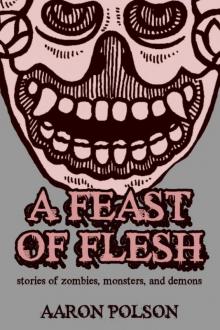 A Feast of Flesh: Tales of Zombies, Monsters, and Demons
A Feast of Flesh: Tales of Zombies, Monsters, and Demons Dead Lands Pass the Ammunition
Dead Lands Pass the Ammunition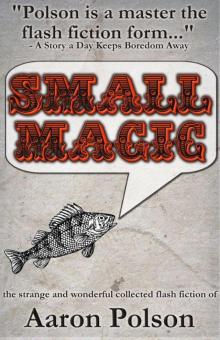 Small Magic Collected Short Stories
Small Magic Collected Short Stories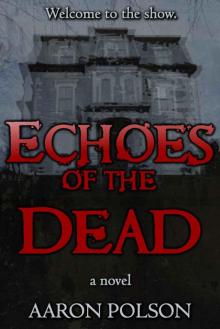 Echoes of the Dead
Echoes of the Dead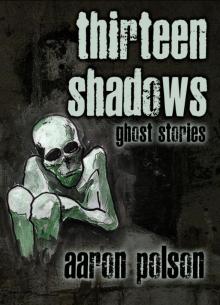 Thirteen Shadows: Ghost Stories
Thirteen Shadows: Ghost Stories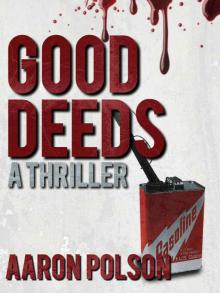 Good Deeds: A Thriller
Good Deeds: A Thriller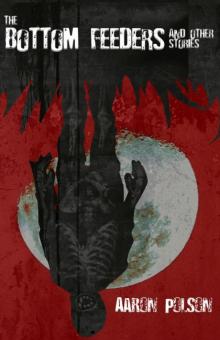 The Bottom Feeders and Other Stories
The Bottom Feeders and Other Stories